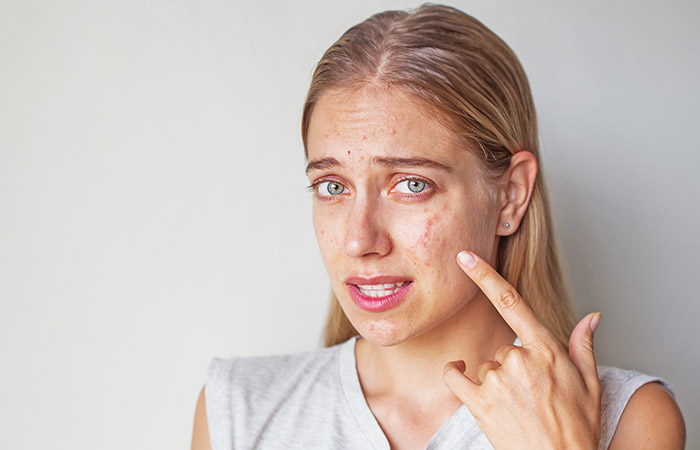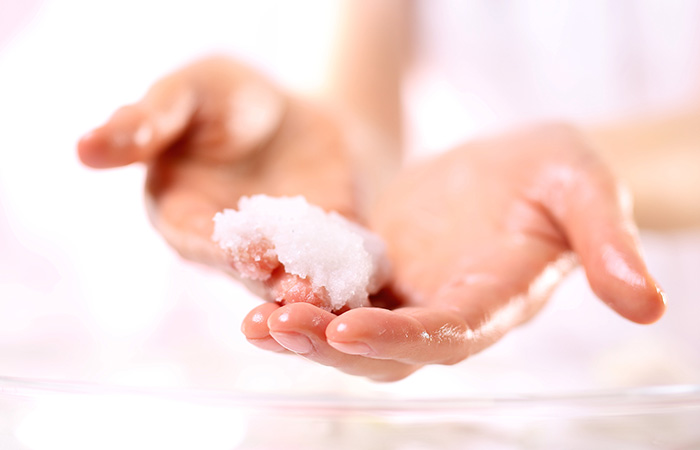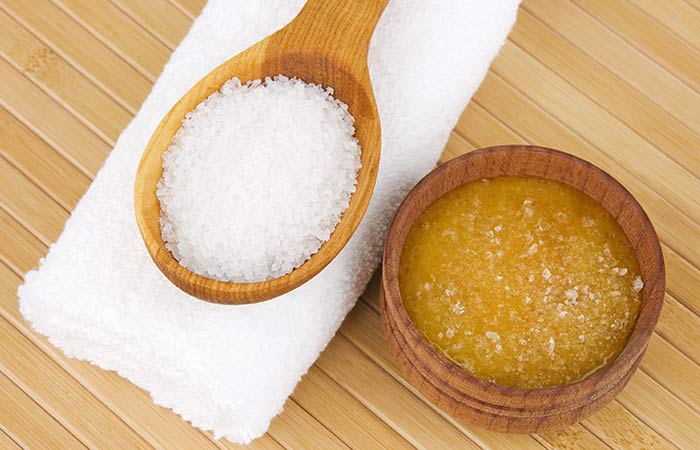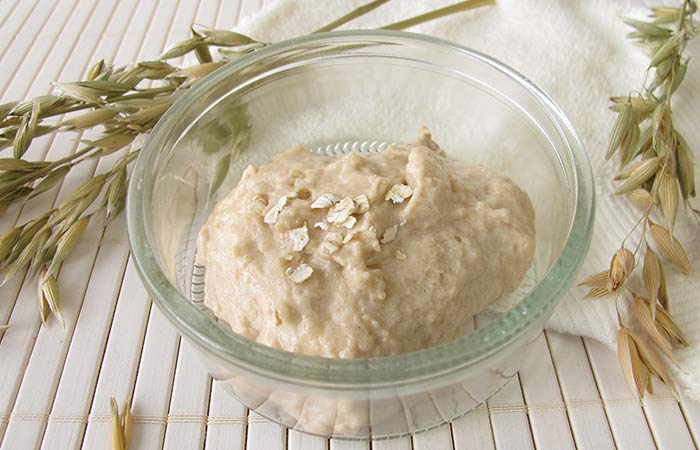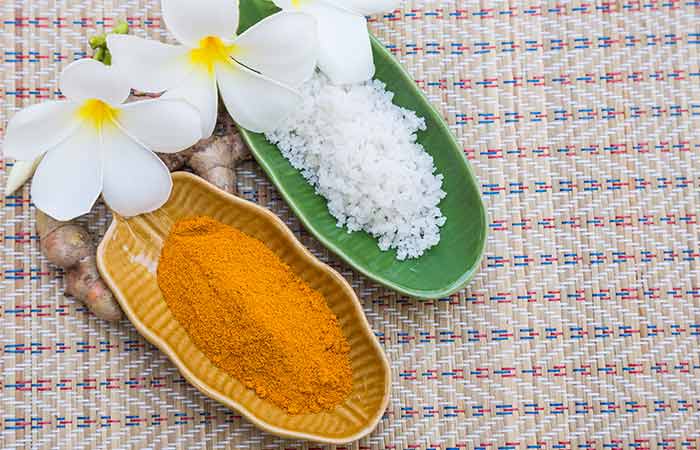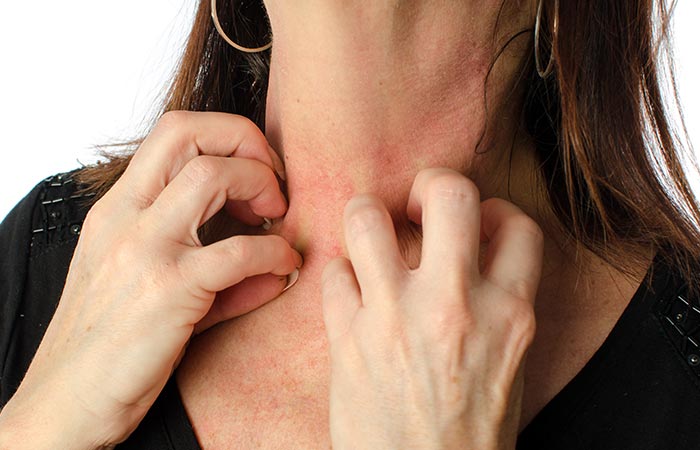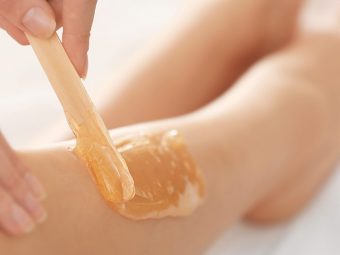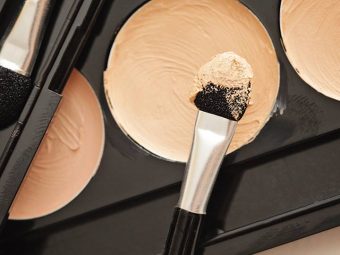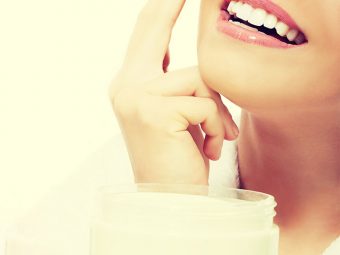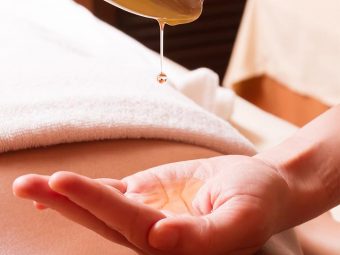Epsom Salt For Acne: Is It Really Effective?
A few simple ways this potent ingredient may cleanse your skin of those pesky pimples.
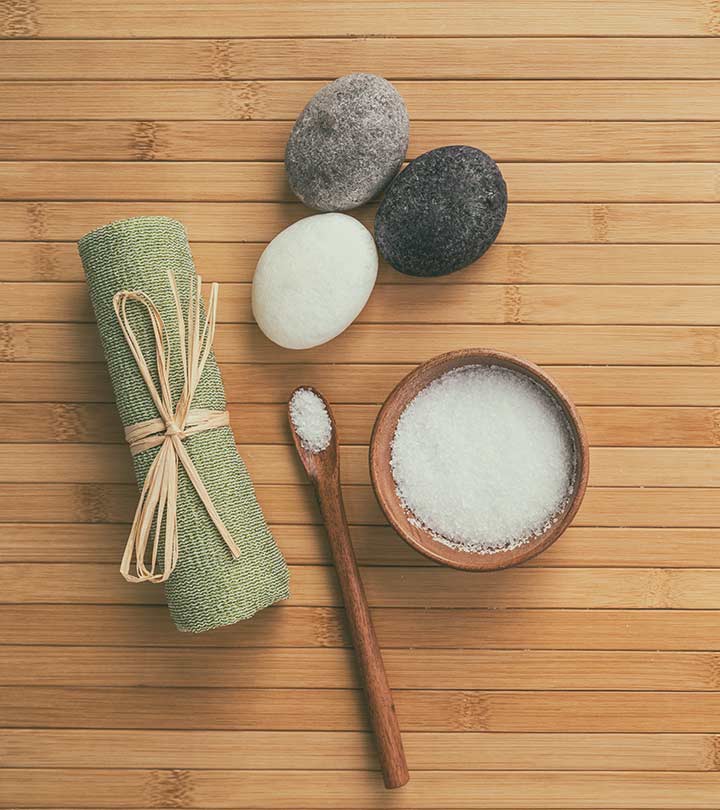
The benefits of Epsom salt for acne have been questioned for a long time owing to the lack of scientific evidence. However, those who witnessed a change in their skin condition swear by its benefits. So, what is Epsom salt? Also known as magnesium sulfate, it is a mineral compound that relieves aching muscles and offers therapeutic and detoxifying effects. Given these benefits, is it a good idea to use this salt for acne or not? In this article, we will explore the anti-acne potential of Epsom salt and the best ways to use it. Keep reading.
In This Article
Is Epsom Salt Effective In Treating Acne?
There is no scientific evidence that suggests that Epsom salt can treat acne. In fact, there are not enough studies to show Epsom salt can even penetrate your skin’s layers. Anecdotal evidence says that soaking in an Epsom salt bath treats several skin-related issues, including acne. Advocates of Epsom salt argue that it:
- Soothes your skin by exfoliating dead skin cells and is beneficial in improving the skin texture. It also relieves conditions, such as eczema and psoriasis.
- Helps relieve stress by relaxing your muscles and soothing your senses. It is said that the magnesium in Epsom salt penetrates your skin and helps raise the magnesium levels in your body, which is crucial for minimizing stress. However, there is no study that claims that magnesium can penetrate your dermal layers.
- Reduces pain, especially pain caused by inflammatory conditions, such as gout and arthritis. People with these conditions experienced a reduction in discomfort and soreness after taking Epsom salt baths.
- Reduces acne, including blackheads, whiteheads, and pimples. Acne is caused when dirt, dead skin cells, and sebum clog your skin pores and cause inflammation. Many people use Epsom salt as a spot treatment to reduce swelling and inflammation.
Absence of proof does not mean that Epsom salt does not work at all. A significant number of people have used Epsom salt and swear by its benefits. Epsom salt is extensively used in traditional Chinese medicine (TCM). It has been used for centuries to promote sleep, relaxation, blood circulation, and detoxification. If you want to use Epsom salt to treat acne, you can try these easy home remedies.
Ways To Use Epsom Salt For Acne
1. Epsom Salt And Water Facial Soak
You Will Need
- 2-3 tablespoons Epsom salt
- 2 cups warm water
- 1 washcloth
Method
- Mix the Epsom salt in water until it dissolves completely.
- Soak the washcloth in Epsom salt water.
- Wring it gently and place it on your face. Don’t cover your eyes.
- Leave the cloth on your face until it cools down.
- Repeat this process several times on all parts of your face (except eyes).
- Rinse your face with warm water.
- Follow this remedy three times a week.
2. Epsom Salt And Avocado Face Mask
Avocado does not treat acne, but it is an excellent base for any face mask. When used with Epsom salt, it has a soothing effect on your skin.
You Will Need
- ½ avocado (mashed)
- 1 tablespoon Epsom salt
Method
- Whip the avocado and Epsom salt together until you get a smooth mixture.
- Spread a thin layer of the mixture on your face.
- Leave it on for 20-30 minutes.
- Wash it off with warm water.
- Repeat this routine three times a week.
3. Epsom Salt And Honey Face Mask
Honey has antimicrobial, antibacterial, and anti-inflammatory properties. The high sugar content in honey prevents bacterial activity, which is why it is widely used to treat many skin conditions (1). When used along with Epsom salt, honey makes for an excellent face mask and scrub.
You Will Need
- 2 tablespoons Epsom salt
- 2 tablespoons organic honey (you may use Manuka honey, if available)
Method
- Mix the honey and Epsom salt until they are combined well. You may adjust the quantity of both as per your convenience.
- Apply the mixture to your face or the affected area.
- Massage gently in a circular motion for a few minutes.
- Leave it on for at least 15 minutes.
- Wash it off with warm water.
- Repeat this process two to three times a week.
4. Epsom Salt And Virgin Coconut Oil Face Mask
Virgin coconut oil soothes and moisturizes your skin and relieves many skin conditions. It has anti-inflammatory properties, and it helps improve the skin barrier function (2). The therapeutic properties of virgin coconut oil, along with Epsom salt, can help reduce acne inflammation.
Note: If you have oily skin, avoid using coconut oil or consult a dermatologist before using it on your skin.
You Will Need
- 2 tablespoons virgin coconut oil
- 1 tablespoon Epsom salt
- 2-3 drops of any essential oil (optional)
Method
- Mix the oil(s) and Epsom salt.
- Massage the mixture on your face or the affected area for a few minutes.
- Leave the mask on for at least 20-30 minutes.
- Wash it off with warm water.
- Repeat this remedy two to three times a week.
5. Epsom Salt And Oatmeal Face Mask
Colloidal oatmeal (finely ground oats boiled in water) is widely used in dermatology for soothing various topical issues. It is known to have anti-inflammatory and antioxidant benefits that can soothe irritated skin (3). This face mask can calm acne and feel soothing on your skin.
You Will Need
- ½ cup oats (ground and boiled)
- 1 tablespoon Epsom salt
- 1 teaspoon honey
- Water (use it to achieve the desired consistency)
Method
- Mix all the ingredients in a bowl.
- Combine well and apply on your face or the affected areas.
- Leave it on for 20-30 minutes.
- Wash it off with warm water.
- Follow this routine three times a week.
6. Epsom Salt And Olive Oil Face Mask
Extra virgin olive oil has anti-inflammatory properties as it contains a compound called oleocanthal (4). Thus, it might help in reducing inflammation around the acne.
You Will Need
- 2 tablespoons Epsom salt
- Extra virgin olive oil (use it to achieve the desired consistency)
Method
- Pour the Epsom salt in a bowl and add extra virgin olive oil to it. Adjust the quantity as per the desired consistency. Mix well.
- Massage the mixture gently on your face for 2-5 minutes.
- Leave it on for another 10-15 minutes.
- Wash it off with warm water.
- Repeat this remedy two times a week.
7. Epsom Salt, Turmeric, And Milk Face Scrub
Milk contains lactic acid that improves skin texture and makes it smooth (5). Turmeric has antimicrobial, anti-inflammatory, and antioxidant properties (6). These properties keep your skin healthy and minimize acne and other types of inflammation.
You Will Need
- ¼ cup milk cream (scoop out the cream from full-fat milk)
- ½ teaspoon turmeric
- 1 tablespoon Epsom salt
Method
- Mix all the ingredients in a bowl.
- Spread the mixture on your face or the affected area(s).
- Leave it on for 15-20 minutes.
- Wash it off with warm water.
- Repeat this routine two to three times a week.
8. Epsom Salt And Baking Soda Bath
There is no scientific proof that baking soda is good for treating acne. However, many people have used it on their face and experienced positive results. This is because of the exfoliating effect of baking soda.
Caution: Avoid this remedy if you have sensitive skin.
You Will Need
- ¼ cup baking soda
- ¼ cup Epsom salt
- 2-3 drops of any essential oil (optional)
Method
- Mix all the ingredients in a bowl.
- Prepare a warm bath and pour the mixture into it. Stir it with your hands to dissolve it completely.
- Soak in the bath for 20-40 minutes.
- Take a shower and follow up with a moisturizer.
- Repeat this routine two times a week.
There is only anecdotal evidence of the benefits of Epsom salt for acne and the skin. In most cases, topical Epsom salt does not cause any negative effects and is considered safe to use. However, there is scope that things might go wrong. Here’s what you need to know.
Side Effects Of Epsom Salt
If you are allergic to sulfur, Epsom salt may cause an allergic reaction. You may experience:
- Nausea
- Skin irritation
- Vomiting
- Drowsiness
- Rashes
- Hives
- Swelling of lips and tongue
Also, soaking in an Epsom salt bath for a prolonged period (more than 30 minutes) may cause dehydration. It is always better to take precautions beforehand to avoid any side effects.
Do an allergy test beforehand to check if you are allergic to Epsom salt.
Though there are not enough scientific studies to support the effectiveness of using Epsom salt for acne, people who have used Epsom salt claim it to be quite effective. Epsom salt is known to relieve aches, soothe inflammation, relax the muscles to reduce fatigue, pain, and stress. If you wish to give it a try, you can follow the recipes discussed in the article and see how your skin feels. However, if you are undergoing any treatment for acne or using any medication, consult a dermatologist before trying this remedy.
Frequently Asked Questions
Is Epsom salt antibacterial?
Anecdotal evidence suggests that Epsom salt functions as an antibacterial and antifungal agent. However, more research is required to prove the same. Consult a doctor about your treatment options before using this remedy.
Which is better: Himalayan salt or Epsom salt?
Both Himalayan salt and Epsom salt offer a number of benefits. Both kinds of baths will help you have a relaxing experience. It is up to you to determine which salt best meets your requirements.
Key Takeaways
- Epsom salt is said to help reduce acne, blackheads, and whiteheads.
- It has been used in traditional Chinese medicine to induce sleep, relaxation, blood circulation, and cleansing.
- If you are allergic to sulfur, Epsom salt may induce nausea, skin irritation, vomiting, sleepiness, rashes, hives, and swelling of the lips and tongue.
References
- “Honey: its medicinal property and antibacterial activity”, Asian Pacific Journal of Tropical Biomedicine, US National Library of Medicine, National Institutes of Health.
- “In vitro anti-inflammatory and skin protective properties of Virgin coconut oil”, Journal of Traditional and Complementary Medicine, US National Library of Medicine, National Institutes of Health.
- “Anti-inflammatory activities of colloidal oatmeal (Avena sativa) contribute to the effectiveness of oats in treatment of itch associated with dry, irritated skin.”, Journal of Drugs in Dermatology, US National Library of Medicine, National Institutes of Health.
- “Topical treatment with oleocanthal extract in reducing inflammatory reactions after photodynamic therapy: a prospective quasi-experimental pilot study.”, Complementary therapies in Medicine, US National Library of Medicine, National Institutes of Health.
- “Epidermal and dermal effects of topical lactic acid.”, Journal of the American Academy of Dermatology, US National Library of Medicine, National Institutes of Health.
- “Effects of Turmeric (Curcuma longa) on Skin Health: A Systematic Review of the Clinical Evidence.”, Phytotherapy Research, US National Library of Medicine, National Institutes of Health.




